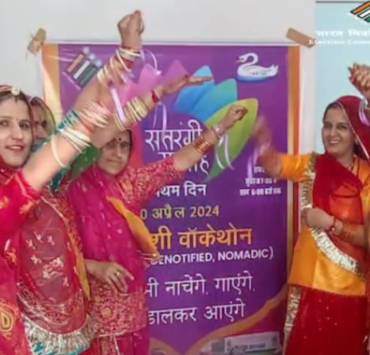
By Kajal Iyer

Recently an old video of Pakistani politician Sherry Rehman being molested during her campaign trail in that country was mischievously doctored to make it appear like a video from the campaign of Indian actor Kangana Ranaut, who is currently standing for election to the Lok Sabha as a candidate of the Bharatiya Janata Party (BJP). Although it was a doctored video, it reminded me of conversations I have had with many female politicians in India who take precautions while interacting with crowds and participating in public functions and have to fight to be taken seriously in the world of politics.
The Madonna/Whore complex is a Freudian concept which describes the way many men tend to see women: as either saintly mother figures or immoral and debased women. Female politicians in India are often subjected to this binary perception.
While on a flight with a prominent female spokesperson of a regional political party, I steered the conversation beyond politics. Curious about her life outside of her political activities, I asked her about her family. She said she was single. As a single person myself, I ventured to inquire further, asking how she managed her life and whether her busy schedule hindered her chances of finding a partner.
This is what she told me: “As a journalist, you are visible, but not subject to the same public scrutiny that we are. You could probably sign up on dating sites, meet like-minded men and decide about who to date. But as a female politician I cannot do that. My romantic or sexual life is always under a microscope. I cannot date publicly. Nor do I meet many men outside our political circles because that would just set tongues wagging. Every interaction with men is scrutinised – so I just avoid speaking to anyone unless it has to do with work.”
The contrast between the reality she spoke about and the situation of male politicians really struck me. In Indian politics, the extramarital affairs of male politicians are often seen as evidence of their power, but any hint of romance or sexuality in the lives of female politicians attracts harsh judgment. Male politicians’ sex lives only come up for scrutiny if a revealing video is leaked or if one of the women in their lives files a police complaint.
Impact of social and economic location
With the implementation of the Constitutional amendments mandating that one third of seats in rural panchayat and urban local body elections be reserved for women to contest, many politicians who were well-entrenched in local politics found themselves unable to stand for election to seats they had traditionally held. In order to retain power in their fiefdoms, they often fielded their wives, daughters and/or daughters-in-law as place-holders. This was possible because reserved seats changed from election to election and the next time around they themselves would be eligible again.
With little exposure to or experience of politics and governance, these women often served as mere figure heads, with minimal involvement in decision making. However, they did have the benefit of being shielded from unwanted public attention since any adverse comments about them would be seen as an affront to their powerful male relatives. Over the years many independent women have made their mark in village-level politics. However, few have been allowed or enabled to move on to other levels of electoral politics.
At the state and national levels, female politicians from privileged backgrounds or political families do face criticism but they are not scrutinised as closely and harshly as those who are first generation politicians or belong to traditionally disadvantaged sections of society. It is also a fact that in political families with male and female siblings, a son has more chances of being selected as the political heir than a daughter.
Many first-generation female politicians complain about being asked for sexual favours. Both caste and class play a major role in the way female politicians are perceived and treated. Take, for example, Mayawati, long-time national president of the Bahujan Samaj Party (BSP) and a former Chief Minister of Uttar Pradesh. She has traditionally and frequently been mocked for her apparent preference for pink outfits, her handbags and, of course, the colour of her skin – all the more because she is Bahujan politician representing “lower” castes. Mamata Bannerjee, founder chairperson of the All India Trinamool Congress Party (TMC) and Chief Minister of West Bengal many times over, is also often mocked for her Bengali accented English, as well as her attire, mannerisms and looks.
References to appearance and previous careers
Appearance plays a significant role in how female politicians are perceived. Politicians who don designer clothes are often dismissed as non-serious, while conventionally attractive women must downplay their looks to be taken seriously.
Female politicians who were earlier active in careers in the performing arts often face a tough situation. When former actor Smriti Irani (now a prominent BJP politician, currently Minister of Women and Child Development in the Union Government) first entered politics, Sanjay Nirupam – a male politician who has been with the Indian National Congress and the Shiv Sena at various times – called her a nachaniya (a pejorative term for a dancer).
Every time Bollywood actor Rekha attended Parliament as a member of the Rajya Sabha, photographers would swoop down on her. Headlines of reports on her infrequent appearances in parliament revolved mostly around her choice of saris.
Actor and producer turned politician, Khushbu Sundar, was widely criticised for saying that the incidence of premarital sex was a growing phenomenon. This was in the context of a 2005 survey by a news magazine on the sexual habits of people residing in the bigger cities of India. To make matters worse, over 20 criminal complaints were filed against her under various laws and it took five years of litigation before the Supreme Court of India quashed all proceedings pending against her in various trial courts.
The TMC’s Nusrat Jahan, also an actor turned politician, faced a lot of trolling regarding her marriage, love life and pregnancy.
Another TMC leader and former MP Mahua Moitra has been targetted for her designer bags, her expensive saris and her no holds barred speech. While an inquiry was on regarding her parliament membership, brought into question over corruption charges, her former partner’s tweets activated an entire army of internet trolls against her.
Recently, a video of her interview with journalist Tamal Saha was doctored. To a question regarding her source of energy, Mahua Moitra said ‘it’s eggs’, but the words were twisted to make it sound like sex. Saha promptly clarified that she had indeed said eggs, but to no avail. The internet trolls had tasted blood.
Although her marriage to already-married actor Dharmendra is a topic for comments and trolling even now, former actor turned parliamentarian Hema Malini is somehow seen more positively. This could be because, as a classical dancer, she performs religious ballets and she is also considered a traditionally loyal wife.
The Madonna
When Jayalalitha was a star in Tamil cinema, the press dubbed her as “Kavarchi Kanni,” a Tamil term signifying her sexual desirability. When she entered politics, her close association and relationship with political leader and former Chief Minister of Tamil Nadu MG Ramachandran (MGR) was often used against her, whereas MGR himself faced little criticism for the same. Following her mentor’s death, Jayalalitha rebranded herself as “Amma” (mother) to sustain her political career. She portrayed herself as a fierce yet nurturing figure and became known for her trend-setting initiatives in launching government schemes that would benefit poor women, while also maintaining strict discipline within the party. In the process she earned respect and adulation from women as well as men, who were often seen falling at her feet in reverence.
Indira Gandhi also adopted the role of a fiery matriarch who would not be cowed down, as well as a strong leader who would not be messed with. In the early days of her political career, socialist leader Ram Manohar Lohia famously called her Goongi Gudiya (the silent/dumb doll). Later she came to be known as “the only man in the Cabinet”, the “Iron Lady of India” and posthumously, in 2010, the 9th most powerful woman of the past century. Even though she went too far by declaring an Internal Emergency in 1975, she had her share of admirers even among opposition leaders, including Shiv Sena leader Bal Thackeray. At the same time, photoshoots at the Prime Minister’s residence frequently portrayed her as the family matriarch, flanked by her sons and daughters-in-law, and as a loving grandmother playing with her grandchildren.
The discourse around Sonia Gandhi’s political life is a good example of the Madonna/Whore complex. To one side of the political spectrum, she is the resilient matriarch who has held the party together and shown kindness and forgiveness even to the killers who assassinated her husband, former Prime Minister Rajiv Gandhi. To the other side, she is a foreigner whose life before her marriage is fair game: she is often maligned with innuendos and invented stories.
Whither equality?
While measures like the Women’s Reservation Act – finally passed in 2023 although unlikely to be implemented before 2029 – are lauded for legally mandating increased female representation in electoral politics, they alone cannot ensure greater acceptance of female politicians. Deep-rooted societal attitudes towards women heavily influence how female politicians are perceived. Until these attitudes change, women in politics will continue to have to grapple with the Madonna/Whore complex.
Sadly, in order to achieve success in politics, women politicians often feel compelled to suppress “feminine” aspects of their personalities and maintain extreme privacy about their personal lives, especially if they are not in conventionally accepted family roles. Despite such efforts to present themselves as politically “acceptable,” fair and equal treatment often remains elusive as they navigate the corridors of power.
Kajal Iyer is an independent media professional with more than 15 years of experience as a broadcast journalist.




